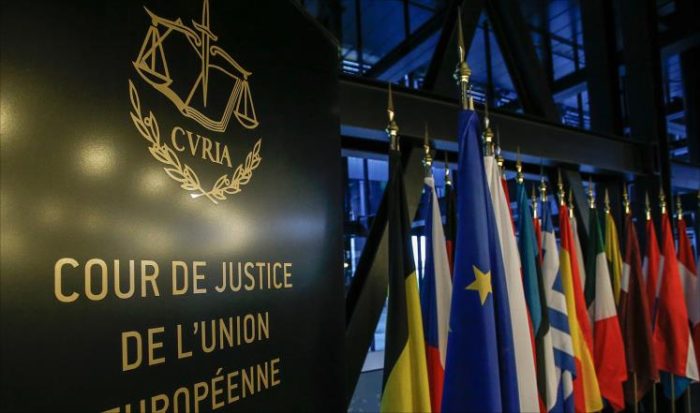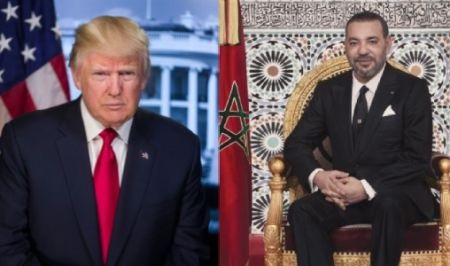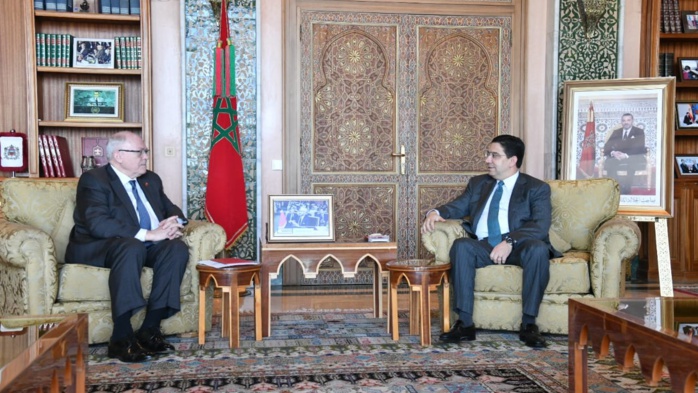An increasing number of countries in Europe have joined their voice to the European Union to express their strong attachment to their strategic partnership with Morocco, following the ruling issued Friday by the European Court of Justice on the fishing and farming agreements concluded between the North African Kingdom and the European bloc.
After the European Commission President Von Der Leyen and the EU Foreign Policy Chief Josep Borrell reiterated in a joint statement the high value the European Union attaches to its strategic Partnership with Morocco, that they scribed as “long-standing, wide-ranging and deep,” and voiced firm resolve “to preserve and continue strengthening close relations with Morocco in all areas of the Morocco-EU Partnership,” several EU members, including France, Spain, Portugal, Belgium, Hungary as well as a number of MePs have reaffirmed commitment to Partnership with Morocco.
In this vein, France reaffirmed its unwavering commitment to its partnership with Morocco that it labelled as “exceptional” and its determination to further deepening it.
The French Ministry of Europe and Foreign Affairs stressed in a press release that the relationship between the European Union and Morocco is of strategic importance, pointing out that France, which “takes note” of the ECJ ruling would continue to work with its European partners to strengthen their exchanges, particularly economic ones, and to preserve the achievements of the partnership, in compliance with international law.
As the President of the French Republic Emmanuel Macron wrote to King Mohammed VI on Morocco’s Throne Day, France remains particularly determined to support Morocco’s efforts to promote the economic and social development of the Sahara for the benefit of the local populations, the Ministry added.
In Madrid, Spanish Foreign Minister José Manuel Albares reiterated before the Foreign Affairs Committee of the Congress of Deputies, Spain’s commitment to the “strategic partnership” with Morocco and its determination to “preserve and promote” this partnership.
The Spanish government will continue to “promote” relations with Morocco, he said, insisting that Madrid’s “commitment to the stability of the relationship with Morocco is firm and will not be altered.” Madrid will continue to “work with the European Union and Morocco to preserve and further develop this relationship,” Albares stressed, underlining the importance of the “strategic partnership” between the EU and Morocco for the two parties as well as for Spain, and the “advantages” that this partnership has brought to the different sectors, including fisheries, agriculture and Moroccan-Spanish trade.
Spain, like many other countries, will continue to encourage the “privileged” relationship between the EU and Morocco, said Albares, who also tackled the Moroccan Sahara issue, recalling that his country’s position on this issue was underlined in the joint declaration of April 7, 2022, issued following the audience King Mohammed VI granted to the President of the Spanish government, Pedro Sánchez, stating that the Moroccan autonomy plan for the Sahara is “the most serious, credible and realistic basis” to settle this conflict.
In the same connection, Portugal deemed EU-Morocco Partnership ‘Essential’ and reaffirming its willingness to work with European partners and institutions “to deepen it in all areas.”
“Portugal considers the partnership between the European Union and Morocco to be essential, and will work with European partners and institutions to deepen it in all areas,” said the Portuguese Foreign Ministry in a statement published on its official website.
Lisbon and Rabat enjoy “a strategic partnership at bilateral level, marked by a long relationship of respect and friendship with great political, diplomatic, and economic substance,” the Portuguese Foreign Ministry said, underlining that in this year, which marks the 250th anniversary of the bilateral peace treaty, strengthening relations with Morocco, both bilaterally and at European level, “is a strategic priority for Portugal.”
The Belgian Foreign Ministry echoed the stand voiced by other EU members, and reiterated Belgium’s attachment to the friendship and strategic partnership between the EU and Morocco and its determination to continue to work to deepen it.
In a statement posted on its X account, the Ministry said that Belgium expressed its support for the joint statement by European Commission President Ursula von der Leyen and EU High Representative Josep Borrell, in which the two officials reaffirmed the EU’s commitment to further preserving and strengthening its close relations with Morocco in all areas, in accordance with the pacta sunt servanda principle.
In the same vein, Italy highlighted the “fundamental” strategic partnership between the EU and Morocco. “The strategic partnership is fundamental between the EU and Morocco, including in agriculture and fishing,” said Deputy Prime Minister, and Foreign Minister, Antonio Tajani, on his X account.
“The European Court should take this into account,” stressed the Italian Foreign Minister. “The Italian government, as I will reiterate during my visit to Rabat, seeks to further strengthen cooperation with Morocco, particularly in the fight against illegal immigration,” he added.
The Netherlands also reiterated “strong commitment to the strategic partnership between the EU and Morocco,” emphasizing that the Netherlands supports the joint declaration by the President of the European Commission and the EU High Representative on the CJEU’s rulings.
Similarly, Finland reaffirmed its “strong commitment” to the strategic partnership between the EU and Morocco and support for the joint statement by the European Commission President and the EU High Representative regarding the CJEU decision.
This joint declaration, a rare political act that underlines the importance of Morocco and materializes the significance of the EU’s partnership with the Kingdom, reiterates the “high value” the EU attaches to “its long-standing, wide-ranging and deep” strategic partnership with Morocco.
Hungary, which holds the rotating presidency of the EU Council, on its part, reiterated its constant position for strengthening the strategic partnership between the EU and Morocco, saying this partnership is “in our common interest.”
“We will continue to serve these interests by strengthening ties and expanding cooperation with Morocco into new areas,” the Hungarian Ministry of Foreign Affairs said.
Austria also reaffirmed its commitment to the “excellent relations” that bind it to Morocco and voiced support to the joint statement by European Commission President Ursula von der Leyen and EU High Representative Josep Borrell on the ECJ’s rulings.
Several members of the European Parliament have also voiced outrage at the ECJ ruling as “undermining European economic interests.”
The ECJ gave in to the claims of “Polisario Front terrorists” over the Sahara and “undermined European and Moroccan economic interests,” while violating “the territorial integrity of the Kingdom of Morocco,” reacted French MEP Nicolas Bay, Vice-President of the European Parliament’s delegation to the Africa-EU Joint Parliamentary Assembly, on the social network X.
“Morocco remains the EU’s most reliable partner in North Africa and its sole interlocutor on all political and trade issues,” commented MEP Tomáš Zdechovský, from the European People’s Party group in the European Parliament.
He added that “polisario” is a “threat to stability and security in the EU’s vicinity.”
“A sad day for Europe,” wrote, for his part, MEP Thierry Mariani, adding that the entire world has understood that the Sahara is Moroccan, “except the ECJ.”
As to Morocco, it says it is in no way concerned by the ECJ ruling as the case involves the EU against the Algeria-backed polisario. Yet, the court’s “decision contains obvious legal errors and suspicious errors of fact,” says a press release issued by the Moroccan foreign ministry, noting that this shows a total ignorance of the case realities, if not a politically biased ruling.



